Camp Morgan was
located on the
picnic grounds of what is now Cacapon State Park in
the Eastern
Panhandle's Morgan County. Operating as CCC Company
1523, the unit had
been transferred to Morgan from Camp Little Fork at
Sugar Grove in the
fall of 1934. Co 1523 was operational as Camp Morgan,
SP-4 until
the late summer of 1941.
During this time, the CCC of Camp Morgan built Cacapon
State Park;
its lodges, cabins, lakes and other recreational
facilities. The
opening of Cacapon as one of the first parks in the
state in 1937 was a
major event, and to highlight the celebration, Mr.
Fechner, National
Head of the CCC, participated in the grand opening.
Other work done by the men of Camp Morgan included
assisting in
development of the historical park in Berkeley Springs
and various
services to local farmers and townspeople.
Note: Clicking on an image below opens a new
window. Close
window to return here.
|
|
Camp Morgan
tents. These were probably used as temporary quarters until the more
permanent
barracks were built.
|
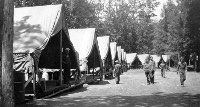
|
This photo was taken on a Sunday in 1940 in Morgan
County. Note the
well-groomed attire of all the CCC enrolees in the
photo. The only
person identified is George Spevock center and in the
back. The photo
was donated by his brother, Frank. The style of
semi-formal dress for
weekend church and similar occasions was the routine
among many of the
"Boys" who were too poor to afford civilian suits.
Camp Morgan had a
long history of successful work from beginning to end
on the
construction of Cacapon State Park, now one of
the most popular
vacation spots in West Virginia.
|
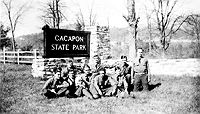
|
The main gate sign of Camp Morgan, SP-4 in 1941. The
three enrollees
are unidentified.
|
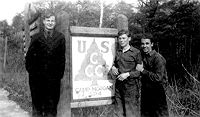
|
Enrollees working on a local farm near the Potomac
River. As indicated,
Maryland was just across the river in the background.
The person on the
left is George Spevock. He and his unidentified
co-worker are
installing and tightening wire of a pasture fence.
|
|
|
The retreat formation one summer evening in 1941 at
Camp Morgan. The
military style
formation with the men "At Ease" suggests this photo
might have been
taken just before the lowering of the flag. With the
playing of the
National Anthem and flag-lowering, the men
would be at
"Attention" and the leaders at "Present Arms"
saluting the flag.
Note the flag ropes are separated and perhaps being
made ready for
action.
|
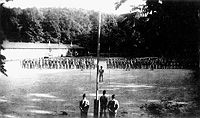
|
This group of dignitaries came to recognize the men of
Camp Morgan and
are pictured in front of one the park cabins built by
Co 1523 in the
1930's. The cabin's rugged durability is symbolic
strength of the CCC
high standards. IT WAS MADE TO LAST!
Third from the right in the front row is Robert
Fechner, the national
director of the CCC. The scene is at the new Cacapon
State Park, near
Berkeley Springs, WV shortly after the park was opened
in July,1937.
(source: Written on the Land")
|
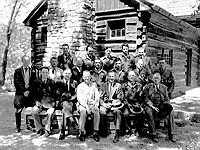
|
This page
is from
the CCC District
newspaper, dated June, 1937. A main lead story is the
opening of
Cacapon State Park on July 1 that year. Anyone who
knew Senator
Jennings Randolph knew of his generosity and
willingness to promote a
good environmental effort and as a person who
championed conservation.
Randolph was a force in keeping the CCC alive as an
agency. Here, in
this article, he mentions the CCC boy he met and
recognized him with
reference in the Congressional Record. Many events in
West Virginia
were so preserved, thanks to his devotion to his
native state.
|
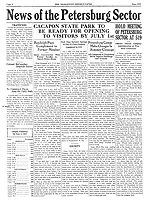
|
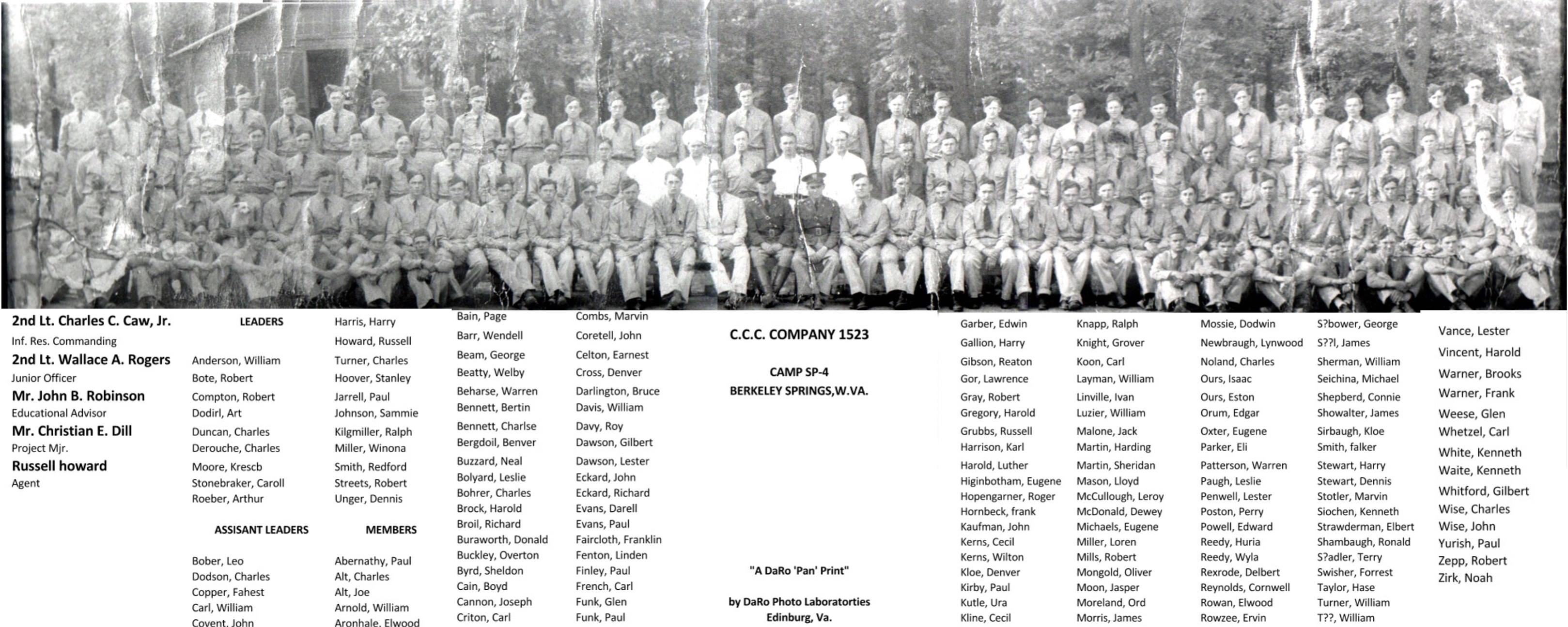
Group
photo of Company 1523, SP4, date unknown.
|
|